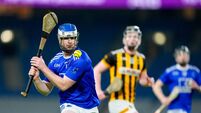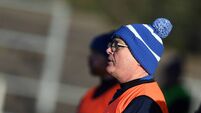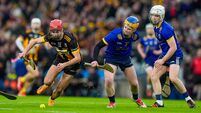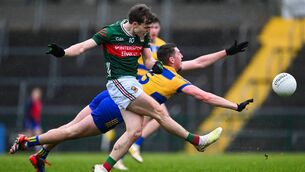Obituaries might be the spark to relight that fire in Mayo's belly
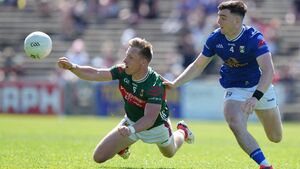
Ryan O'Donoghue is unable to retain possession under pressure from Cavan's Niall Carolan. Picture: INPHO/James Lawlor
Two Sundays in MacHale Park, two weeks apart. Both of them end with Mayo losing a one-score championship game, but outside of that, similarities between the county’s recent defeats to Galway and Cavan are hard to find.
Against Galway, Mayo’s strategy was easy to identify. Against Cavan, not so much.
Regardless of the quality of the Connacht final, it was hailed across the country as a contest that at least matched, if not bettered, the Ulster final in terms of physicality and intensity; yet it seemed as if Cavan were able to work the ball from one of the field to the other unimpeded at times last Sunday. Most of all, against Galway, Mayo clearly and visibly threw the kitchen sink at their neighbours in a bid to find a way. Players tried to make things happen, and in a lot of cases, it just didn’t come off. Against Cavan, it felt like Mayo barely flapped a dishcloth in resistance, never mind the full sink.
The loudest voices in the aftermath of a defeat like that on Sunday, where 1-2 in stoppage time for the home side masked the scale of Cavan’s superiority, will usually be heard decrying a lack of desire and fight. This column only mentions such nonsense to take it off the table entirely as a topic of discussion. These players have done more than enough in their careers to make it clear that they have a deep emotional bond with the green and red jersey, and the county it represents.
What is true, however, is that narrow defeats have become a little bit of a bad habit in the last couple of years, and in an effort to try and buck that trend, Sunday’s contest illustrated that the path Kevin McStay and his coaches are steering the team down is one of much more control, and it’s not sitting well with the natural Mayo psyche.
The day before this game, Dublin travelled to Salthill and came away with a one-point win in a contest where the Dubs played just like a Jim Gavin team. When the play was methodical and tactical, they managed those exchanges and gradually built up their lead. When things were chaotic and heated in front of over 20,000 supporters, Galway thrived.
Yet if Galway played Mayo again tomorrow, the narrative from pundits would be that Galway would be the more controlled side of the two. The old phrase that an elite footballer should have “fire in the belly and ice in their veins” is fair, and when it comes to Mayo, there has never been any issue with the first part of that equation, but doubts have existed and still remain about the latter.
Whether Mayo’s glitches in the closing stages of tight championship games in recent years, as seen in the Connacht final, or against Derry and Dublin last year, or even against Cork in 2023, the remedy has to work with the identity and personality of Mayo football. If Mayo are ever to end the longstanding famine and end the quest for Sam Maguire that has lasted for three quarters of a century now, it will only happen by being true to Mayo GAA’s nature, not by trying to be a replica of Dublin, or Kerry, or Armagh.
For other teams, such as many Ulster sides, that involves weaving together intricate team units where the collective outperforms the sum of the individual parts. Kerry will always be at their best when they lean heavily into their kick-passing game, and for Tyrone, it’s often said that much of their current identity stems from their All-Ireland final defeats in 1995 and 1996. First Dublin beat them by leaving Charlie Redmond on the field after he was sent off, then Meath beat them through sheer aggression, brutalising Peter Canavan. Now, whatever else happens to a Tyrone team, they won’t be outdone by anyone when it comes to the darker arts.
Mayo have produced their fair share of naturally gifted footballers down the years, but they’ve produced far more footballers that could be described as forces of nature. Players that might not be mercurial, but through sheer force of will, they shape the course of football matches by making incredible catches, barnstorming runs, and by simply refusing to lie down.
That’s not to say that Mayo lay down on Sunday, but once Gerard Smith crashed in that goal at the start of the second-half, the contest was moving Cavan’s way. Yet perhaps due to their determination to control the tempo and to deploy a collective strategy, there were no moments where a Mayo player decided to change it up and change the narrative.
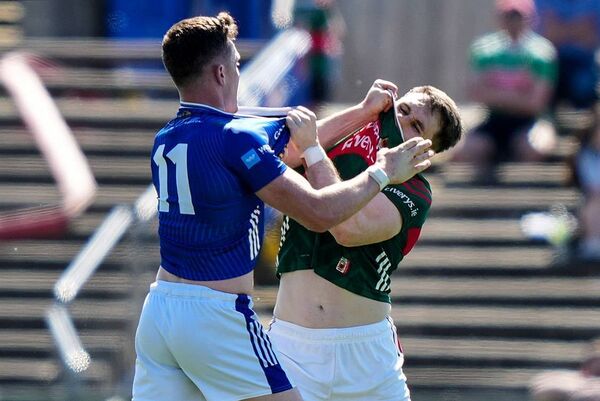
After the game, when asked about two long balls into Aidan O’Shea in the second-half that yielded a converted free and that late goal, Kevin McStay replied that as a coaching unit, they trust their players to assess the game in front of them and play what they see. He was of course correct – no elite team can really thrive if they are micromanaged to that extent – but it begs the question, why did none of the players realise that Mayo needed to get the crowd into the game, and that required a big moment? Kildare’s John Doyle is the most naturally talented attacker that county has ever produced and he’s not an especially big player, but those who played against him will recall moments when a game wasn’t going Kildare’s way and Doyle would call a kickout onto himself, knowing that the opposition would hear him. Then he’d win it anyway, and the Lilywhites would be energised.
Remember Cillian McDaid’s barnstorming 60 metre run in the Connacht final, that had the same effect?
At the risk of singling out players, where was Enda Hession or Jordan Flynn to try to do the same? Even if they went for goal and charged straight into a Cavan man, knocking him back and conceding a free for charging, the crowd would have reacted, a physical marker would have been laid down, and the temperature would have gone up.
Why did Aidan O’Shea not scream out to the players in the middle third that he wanted the next ball coming down onto his head after passing through the sparse cirrus clouds in the sky? Where was Ryan O’Donoghue’s attempt to go out in the middle third and try and get a score from deep, because Niall Carolan had him all bottled up? Why did David McBrien not look to plant a Cavan player back on his heels, take a yellow card and send out a message of ‘thou shalt not pass’?
Likewise on the sideline, game changers were needed earlier. Fenton Kelly would be described by many as a player suited to certain roles and situations, but Paul Towey, Fergal Boland and Paddy Durcan were much more likely to be game changers. The first of those came in with ten minutes to play and Cavan four points ahead.
It’s only natural that the Connacht final, given the context that preceded it, would cause Mayo to question themselves in many respects. But the answer they seem to have arrived at is to dial up the level of controlled, pre-planned football, at the expense of the stuff that makes Mayo, Mayo.
Perhaps the obituaries, which will be plentiful this week, might be the spark to relight that fire in the belly. And when that’s back, then it’ll be time to go back to the drawing board when it comes to ice in the veins.
